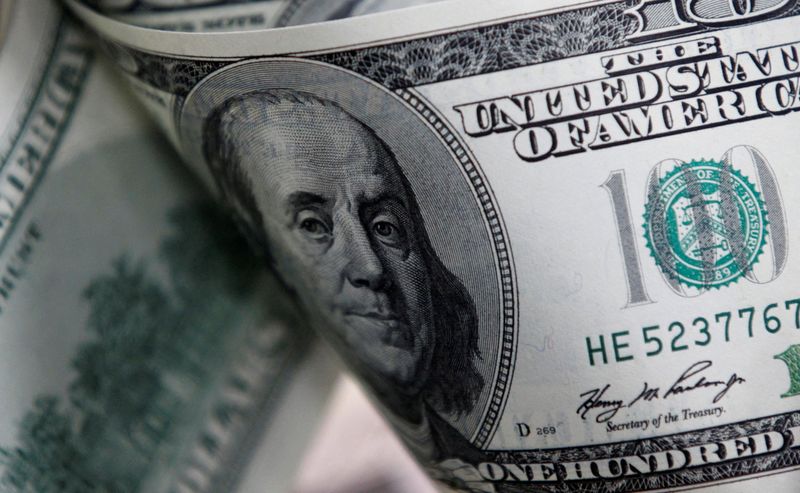Morning Bid: Dollar flexes on Trump swipe, French politics, yuan slide
A look at the day ahead in U.S. and global markets from Mike Dolan
The dollar breezed into December on the front foot, helped by Donald Trump's weekend support for its global reserve status just as the euro wavered on tense French politics and China's yuan swooned on fresh easing expectations there.
As U.S. markets return in earnest from Thanksgiving into the final month of a bumper year, the dollar recaptured its mojo after a tepid holiday week for the greenback.
Without any obvious prompt, the President-elect's latest social media swipe warned the BRICS bloc of developing nations against pushing a rival currency to the dollar in global trade and commerce - adding they faced 100% tariffs if they did.
While the trade threat seems notional, it contained some heft in markets who had assumed a second Trump presidency would be overtly behind weakening the dollar's value. Reserve status and exchange rate value are two different things, of course, but the comments seemed to bolster the currency nonetheless.
More immediately the 0.5% jump in the dollar index on Monday was driven largely by the relapse in the euro as markets assessed the risk of a collapse of the French government.
France's far-right National Rally will likely back a no-confidence motion against the government unless there's a "last-minute miracle", with lawmaker Marine Le Pen giving Prime Minister Michel Barnier until Monday to yield to RN's demands as a part of protracted horse trading over the annual budget plan.
The euro fell almost a cent at one point first thing on Monday before regaining a toehold above $1.05 and France's benchmark CAC 40 dropped more than 1%.
And yet French sovereign debt, in the eye of the storm, appeared calmer - with nominal 10-year yields falling to their lowest in a month and premiums over German equivalents edging in from Friday's levels.
Part of the subsidence of borrowing costs is related to heightened expectations of European Central Bank easing as the euro wide economy struggles and German manufacturing activity shrinks amid auto sector woes, trade worries and election angst.
German bund yields fell to their lowest since early October, eyeing lows of 2% for the first time since January.
But the other balm for French bonds was relief that Standard & Poor's on Friday held its rating on France's long-term sovereign debt steady at "AA-" and kept its outlook at stable.
And it wasn't just euro government yields on the retreat.
Despite more upbeat November business surveys from China this weekend, which helped benchmark stocks indexes there outperform on Monday, intense speculation about further easing from the People's Bank of China saw 10-year yields dip below 2% for the first time on record - more than 220 basis points below U.S. equivalents.
The move, as the PBOC tries to bring deposit rates offered by banks to brokerages and fund companies in line with its official 1.5% reverse repo policy rate, saw the offshore yuan fall to its weakest level since July.
Speculation is rife that China will respond to any renewed tariff hikes from an incoming Trump administration by allowing a weaker yuan, partly offsetting the impact on its exports to the United States.
But before we even get there, further restrictions on U.S.-China trade were due on Monday, with the U.S. due to launch its third crackdown in three years on China's semiconductor industry - curbing exports to 140 companies including chip equipment maker Naura Technology Group among other moves.
Back on Wall Street, the new week brings another critical sweep of labor market updates - now central to Federal Reserve thinking as it heads towards its final meeting of the year and after unusual payroll weakness in October.
After several jobs market cuts through the week, Friday brings the November employment report. Payrolls growth is expected to have bounced back to 183,000 during the month compared to the meager 12,000 recorded for October.
Still, much like sovereign bonds elsewhere, U.S. Treasury yields - which tumbled sharply through the past week to confound many post-election bets - remain subdued first thing on Monday. Key U.S. manufacturing readouts for last month are due from ISM and S&P Global later.
U.S. stock futures, which ended the shortened week on a high last Friday, ticked back slightly ahead of the bell.
In corporate news, and partly reflecting the auto sector shudder in Europe as trade war fears mount, shares in Stellantis (NYSE:STLA ) slumped almost 9% to two-year lows after CEO Carlos Tavares resigned abruptly on Sunday and deepened investors' worries about the turnaround of the world's No. 4 carmaker.
Key developments that should provide more direction to U.S. markets later on Monday:
* US November manufacturing surveys from ISM and S&P Global, October construction spending
* Federal Reserve Board Governor Christopher Waller and New York Fed President John Williams speak
* US corporate earnings: Zscaler (NASDAQ:ZS )
* German Foreign Minister Annalena Baerbock visits China
(By Mike Dolan,; Ця електронна адреса захищена від спам-ботів. Вам необхідно увімкнути JavaScript, щоб побачити її.)
Source: Investing.com
